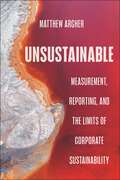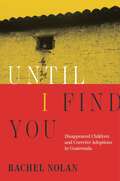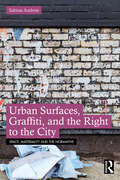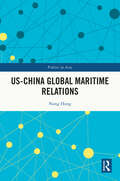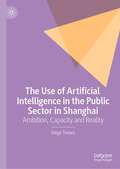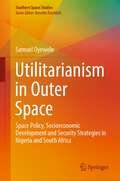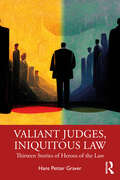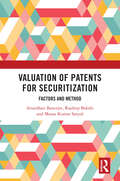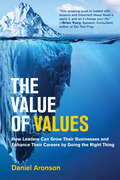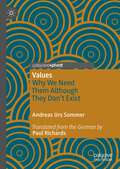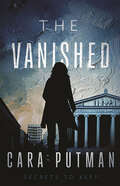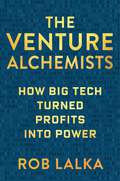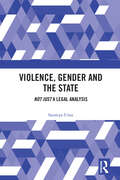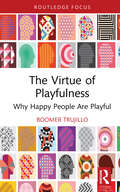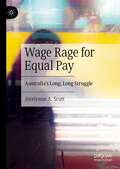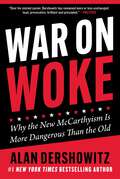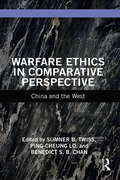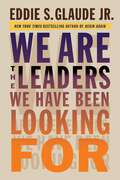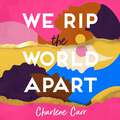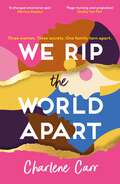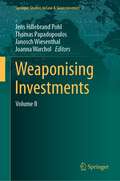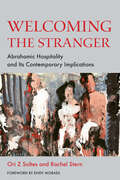- Table View
- List View
Unsustainable: Measurement, Reporting, and the Limits of Corporate Sustainability
by Matthew ArcherA behind-the-scenes look at how corporate and financial actors enforce a business-friendly approach to global sustainabilityIn recent years, companies have felt the pressure to be transparent about their environmental impact. Large documents containing summaries of yearly emissions rates, carbon output, and utilized resources are shared on companies’ social media pages, websites, and employee briefings in a bid for public confidence in corporate responsibility.And yet, Matthew Archer argues, these metrics are often just hollow symbols. Unsustainable contends with the world of big banks and multinational corporations, where sustainability begins and ends with measuring and reporting. Drawing on five years of research among sustainability professionals in the US and Europe, Unsustainable shows how this depoliticizing tendency to frame sustainability as a technical issue enhances and obscures corporate power while doing little, if anything, to address the root causes of the climate crisis and issues of social inequality. Through this obsession with metrics and indicators, the adage that you can’t manage what you can’t measure transforms into a belief that once you’ve measured social and environmental impacts, the market will simply manage them for you.The book draws on diverse sources of evidence—ethnographic fieldwork among a wide array of sustainability professionals, interviews with private bankers, and apocalyptic science fiction—and features analyses of name-brand companies including Volkswagen, Unilever, and Nestlé. Making the case for the limits of measuring and reporting, Archer seeks to mobilize alternative approaches. Through an intersectional lens incorporating Black and Indigenous theories of knowledge, power and value, he offers a vision of sustainability that aims to be more effective and more socially and ecologically just.
Until I Find You: Disappeared Children and Coercive Adoptions in Guatemala
by Rachel NolanThe poignant saga of Guatemala’s adoption industry: an international marketplace for children, built on a foundation of inequality, war, and Indigenous dispossession.In 2009 Dolores Preat went to a small Maya town in Guatemala to find her birth mother. At the address retrieved from her adoption file, she was told that her supposed mother, one Rosario Colop Chim, never gave up a child for adoption—but in 1984 a girl across the street was abducted. At that house, Preat met a woman who strongly resembled her. Colop Chim, it turned out, was not Preat’s mother at all, but a jaladora—a baby broker.Some 40,000 children, many Indigenous, were kidnapped or otherwise coercively parted from families scarred by Guatemala’s civil war or made desperate by unrelenting poverty. Amid the US-backed army’s genocide against Indigenous Maya, children were wrested from their villages and put up for adoption illegally, mostly in the United States. During the war’s second decade, adoption was privatized, overseen by lawyers who made good money matching children to overseas families. Private adoptions skyrocketed to the point where tiny Guatemala overtook giants like China and Russia as a “sender” state. Drawing on government archives, oral histories, and a rare cache of adoption files opened briefly for war crimes investigations, Rachel Nolan explores the human toll of an international industry that thrives on exploitation.Would-be parents in rich countries have fostered a commercial market for children from poor countries, with Guatemala becoming the most extreme case. Until I Find You reckons with the hard truths of a practice that builds loving families in the Global North out of economic exploitation, endemic violence, and dislocation in the Global South.
Urban Surfaces, Graffiti, and the Right to the City
by Sabina AndronThis landmark book focuses on urban surfaces, on exploring their authorship and management, and on their role in struggles for the right to the city. Graffiti, pristine walls, advertising posters, and municipal signage all compete on city surfaces to establish and imprint their values on our environments. It is the first time that the surfacescapes of our cities are granted the entire attention of a book as material, visual, and legal territories. The book includes a critical history of graffiti and street art as contested surface discourses and argues for surfaces as sites of resistance against private property, neoliberal creativity, and the imposition of urban order. It also proposes a seven-point manual for a semiotics of urban surfaces, laying the ground for a new discipline: surface studies. Page after page and layer after layer, surfaces become porous and political and emerge as key spatial conditions for rethinking and re-practicing urban dwelling and spatial justice. They become what the author terms the surface commons. The book will appeal to a wide readership across the disciplines of urban studies, architectural theory and design, graffiti, street art and public art, criminology, semiotics, visual culture, and urban and legal geography. It will also serve as a tool for city scholars, policy makers, artists, and vandals to disrupt existing imaginaries of order, justice, and visibility in cities.
Urban Surfaces, Graffiti, and the Right to the City (ISSN)
by Sabina AndronThis book explores the ownersheir authorship and management, and their role in struggles for the right to the city. Includes a critical history of graffiti and street art as contested surface discourses. Interdisciplinary appeal.
US-China Global Maritime Relations (Politics in Asia)
by Nong HongThis book explores the U.S.-China maritime relationship, examining the development and implementation of the maritime strategies of both the United States and China. Delving into the U.S.-China maritime relationship within the global context, the book investigates six key maritime regions: the South China Sea, the Northeast Asia waters (the East China Sea, the Yellow Sea), the Indian Ocean, the South Pacific Ocean, as well as the Arctic and Antarctic regions. Its observations form a comprehensive exploration of these regions and their significance in shaping the dynamics between the two nations, and this analysis reveals that an expanded view is necessary to discover and clearly display the role that these maritime regions currently—and could potentially—play in overarching U.S.-China relations. Examining both the ongoing conflicts and opportunities for cooperation in the global maritime domain between the United States and China, this book will be a valuable resource to students and scholars of international relations, Chinese and U.S. politics, strategic studies, and maritime studies.
The Use of Artificial Intelligence in the Public Sector in Shanghai: Ambition, Capacity and Reality
by Diego TodaroThis book examines how Shanghai aims to improve public service provision by accelerating the use of artificial intelligence (AI) in the public sector. After clarifying the technical and social factors that shape the use of AI in this area, the book delves into the AI policy environment and AI ecosystem of Shanghai to gauge the city’s capacity to implement public sector AI applications. Then it examines how this capacity translates into real-world policy initiatives through the investigation of case studies. It highlights the analytical, operational and political capabilities that determine the strengths and limitations of such initiatives in deploying AI in the public sector, and it assesses their impacts on public service provision in Shanghai. By using the findings on Shanghai to gain a deeper understanding of key topics in public sector AI research, this book also contributes new knowledge about the use of AI to improve the provision of public services.
Utilitarianism in Outer Space: Space Policy, Socioeconomic Development and Security Strategies in Nigeria and South Africa (Southern Space Studies)
by Samuel OyewoleThis book showcases Nigerian and South African experiences on space politics, policy and strategy vis-à-vis their development and security aspirations, while contributing to the broader African and the Global-South perspectives on the subject. Space policy in developing countries such as Nigeria and South Africa is motivated by utilitarian promises that space and the attendant technologies have the potential to advance development and security interests of the affected nations. However, several decades into the orbital journey of these countries, little is known of their space politics, policies, strategies, capacities and capabilities, and realisation of desired objectives. Beyond pure and applied sciences reductionism, this book offers social science perspectives on space studies in Africa, as it examines the intricate relationships of historical, geographical, social, demographic, economic, political, administrative, and strategic factors, nationally, regionally and globally that have shaped research and development of space science and technologies, and their benefits, in Nigeria and South Africa.
Valiant Judges, Iniquitous Law: Thirteen Stories of Heroes of the Law
by Hans Petter GraverThis book is about heroes of law. It provides examples of when judges have exercised courage, moderation, wisdom, and justice rather than blindly following the law. It also discusses the contentious issue of whether a judge has a moral responsibility to defend the rule of law, regardless of what the law actually states. The work presents a collection of thirteen stories about judges who in different settings have stood up against the authorities and public opinion in the defence of the rule of law. An introductory chapter sets the scene with two examples of situations gone wrong when those applying the law have just followed the demands of those in power. The thirteen stories are followed by two theoretical chapters discussing the moral responsibility of the judge. Finally, the book explores the kind of ethical theory required to guide judges in the assessments they must make, and the choices they have to take in order to fulfil their moral responsibilities. It is argued that the classic virtues of courage, moderation, wisdom, and justice are all qualities that can contribute to both sound judgment and reflection. The book thus seeks to nurture a realistic culture and a tradition of cultivating lawyers who defend the rule of law. Against a background where the history of our legal institutions when put to the test, is largely nothing to be proud of, the work seeks to change this by highlighting and reflecting on the exceptions. The book will be illuminating reading for students and academics working in the areas of Jurisprudence, Legal Ethics, and Legal History.
Valuation of Patents for Securitization: Factors and Method
by Arundhati Banerjee Rajdeep Bakshi Manas Kumar SanyalIntellectual property rights and assets have become a major contributor to market capitalization for different companies. This book discusses the processes of valuation of patents and the legal and regulatory concerns around patent securitization.Patents are used as an instrument of securitization to attract funds towards supporting further research and monetisation which opens-up new areas of research. They are utilised through means such as licensing, sale and purchase, financing and others. This book provides an in-depth look into the importance of patents and more importantly their securitization. It analyses the patent securitization applications as well as existing methods towards gauging the suitability of patents. The authors explore simple yet suitable methods for the valuation of patents that can be applied to the existing models to arrive at a pragmatic value. The book also includes studies and tests these systems for their reliability and application in different research areas and companies.This book will be of interest to practitioners involved in financing and monetisation of patents, academics, researchers and students working in patent valuation, financial management, economics international economics.
The Value of Values: How Leaders Can Grow Their Businesses and Enhance Their Careers by Doing the Right Thing (Management on the Cutting Edge)
by Daniel AronsonHow business leaders can grow profits and competitive advantage by doing the right thing.Acting on values—doing good for the benefit of all—can substantially benefit the bottom line, but many business leaders mistakenly believe that doing the right thing lowers profits. This belief is the greatest barrier holding businesses back from being more financially and competitively successful—and delivering more good for the world. Not only can it be a winning business strategy to act on values, as Daniel Aronson suggests in The Value of Values, but it is also a savvy choice, increasing a company&’s power, profit, and competitive advantage—in many cases with little additional investment or risk.It starts with seeing what others miss. Using extensive research and real-world calculations, Aronson demonstrates that the &“submerged value&” of initiatives such as taking bold action to combat climate change, helping people find jobs, or creating an open, inclusive work environment is normally 4 to 10 times more than initially believed. Calculating and capturing the true business benefit of acting on values provides a much-needed update to the sustainability and responsibility playbook. Even more important, it shows executives how to harness the value of values to improve profitability, acquire customers, and turbocharge their own careers.Written by a measurement pioneer and one of the world&’s foremost experts on making ethical business count, The Value of Values trains leaders to respond smartly and credibly to today&’s challenges, transforming how business can and should be done.
Values: Why We Need Them Although They Don’t Exist
by Andreas Urs SommerIn his book, Andreas Urs Sommer reflects on the question of what it really means when everybody’s appealing to values, all the time – the question, fundamentally, of what values actually are. Values explores both of these points, arriving at two intriguing suggestions: Maybe what we call values are just a set of elaborate fictions. And maybe those fictions serve some very important purposes.
The Vanished: A Novel
by Cara Putman"Putman's legal expertise shines in this compelling and intricately plotted romantic suspense. Highly recommended!" --Colleen Coble, USA Today best-selling author Janae Simmons left the small town of Kedgewick, Virginia, ten years ago to pursue her legal career and never looked back--until a professional mistake leads her to her grandmother's historic carriage house and to the town where her past threatens to find her. The quiet streets echo with her grandfather's sterling reputation, one that conflicts with fresh questions that claw at Janae, launching her on a reluctant journey to unearth his secrets. When her new job at a local law firm doesn't live up to expectations, she wonders if coming home was the right decision. Carter Montgomery starts his art preservation career with the only job he can get--director at the Elliott Museum of Art. At least Kedgewick is a nice enough town to provide him and his nephew with a safe place to grieve the loss of Carter's sister. But Carter's calm days disappear when an elderly woman claims two paintings in the museum's collection were stolen from her family during World War II. Carter enlists Janae's help to unravel the legal labyrinth of art ownership, and the peaceful facade of Kedgewick morphs into a hot bed of secrets. When an attorney turns up dead and Janae uncovers another painting, what began as a simple legal issue spirals into a race against time. As the web of intrigue tightens, the duo must confront a looming question: What dark truths lie beneath the surface, waiting to be exposed? "Cara Putman has once again created an exciting cast of characters. I was immediately drawn in by Janae and Carter's unique chemistry. This is one story you don't want to miss." --Rebecca Hemlock, award-winning author of Fury in the Shadows
The Venture Alchemists: How Big Tech Turned Profits Into Power
by Rob LalkaWe once idolized tech entrepreneurs for creating innovations that seemed like modern miracles. Yet our faith has been shattered. We now blame them for spreading lies, breaking laws, and causing chaos. Yesterday’s Silicon Valley darlings have become today’s Big Tech villains. Which is it? Are they superheroes or scoundrels? Or is it more complicated, some blend of both?In The Venture Alchemists, Rob Lalka demystifies how tech entrepreneurs built empires that made trillions. Meta started as a cruel Halloween prank, Alphabet began as a master’s thesis that warned against corporate deception, and Palantir came from a campus controversy over hateful speech. These largely forgotten origin stories show how ordinary fears and youthful ambitions shaped their ventures—making each tech tale relatable, both wonderfully and tragically human. Readers learn about the adversities tech entrepreneurs overcame, the troubling tradeoffs they made, and the tremendous power they now wield. Using leaked documents and previously unpublished archival material, Lalka takes readers inside Big Tech’s worst exploitations and abuses, alongside many good intentions and moral compromises.But this story remains unfinished, and The Venture Alchemists ultimately offers hope from the people who, decades ago, warned about the risks of the emerging Internet. Their insights illuminate a path toward more responsible innovations, so that technologies aren’t dangerous weapons but valuable tools that ensure progress, improve society, and enhance our daily lives.
Verantwortungsvolle Digitalität: Warum wir den digitalen Wandel gestalten sollten
by Christoph BöhmDigitale Produkte, Dienste sowie Kommunikationsformen zeichnen sich besonders dadurch aus, dass sie im physikalischen Sinne immateriell sind. Aus dieser Eigenschaft folgen vielfältige Möglichkeiten, Lebenspraktiken und Lebenswelten individuell zu gestalten. Leicht zu verbreitende Digitalprodukte vermitteln gesteigerte Wirksamkeitserfahrung, welche den Digitalen Wandel wirtschaftlich, technisch und gesellschaftlich in Gang hält. Wachstumsgrenzen scheinen durch disruptive Innovationen der Künstlichen Intelligenz, der digitalen Vernetzung sowie auch der Virtualisierung von Lebenswelten zu diffundieren. Ein systemischer Blick auf die Veränderungsdynamiken führt zur Einsicht, dass Anerkennungswettläufe zur Sicherung der sozialen Position entbrennen. Um einer Abwärtsspirale zu entfliehen, fühlen sich Individuen sowie wirtschaftliche Akteure genötigt, Verwirklichungschancen der Digitaltechnologie ergreifen zu müssen, da ansonsten die Todeserfahrung einer sozialen oder wirtschaftlichen Irrelevanz droht. Diesem Krisenphänomen setzt das Buch eine Idee entgegen, wie aus selbstfürsorglicher Integrität heraus eine lebensdienliche und vor allem gerechte Digitalität verwirklicht werden könnte.
Violence, Gender and the State: ‘Not Just’ A Legal Analysis
by Saumya UmaThis book examines the adequacy of laws in India as a response to sexual and gender-based violence against women. It addresses questions such as: is law doing enough in responding to violence against women in India? Where are the barriers and bottlenecks, particularly for women from marginalised communities? What can be done to ensure that justice is rendered? Based on women’s experience of violence, not solely on the basis of gender, but a combination of caste, class, and religious and gender identities, the book examines law as a response to gendered violence against women in India through the lens of intersectionality. It combines socio-legal and feminist analyses of relevant statutes on sexual and gender-based violence, their judicial interpretations, their implementation by law enforcement agencies, and their ramifications for women’s lives. This book will be of interest to academics, research scholars, and students in a range of disciplines, including law, women’s studies, gender and sexuality studies, victimology, sociology, political science, and human rights. It will also be useful for policymakers, advocates, judicial officers, paralegal workers, women’s rights campaigners, non-profit organisations and, globally, anyone interested in and concerned with justice for women in India.
The Virtue of Playfulness: Why Happy People Are Playful (Routledge Focus on Philosophy)
by boomer trujilloThis book argues that in order for people to live well, they must develop a virtue of playfulness. Inspired by Aristotle, the book draws on work from philosophy, classics, history, biology, psychology, and media studies to understand the place of play and playfulness in a good life.Many philosophers have written about play, from Presocratics such as Heraclitus to contemporary philosophers such as Bernard Suits. Some champion play as the most crucial value in life. Others deride it and warn strongly against it. This book evaluates the research on how play and playfulness bear on living a good life and becoming a good person. Its main argument is that in order to understand play as an action, we must understand playfulness as a virtue in the lives of good people. The author develops a theory of playfulness from an Aristotelian perspective. Like Aristotle sees the virtues as necessary for a happy life, the author argues that playfulness is necessary for living well. And just as Aristotle offers multifaceted characterizations of core virtues, the author argues that playfulness includes aspects of seriousness, creativity, humility, optimism, and sociality. Playful people take play seriously, learn new skills, overcome failure, strive for success, and keep others in mind. As a result, playful people have a better shot at living well.The Virtue of Playfulness is an accessible, empirically informed, and detailed treatment of the philosophy of playfulness. It will appeal to scholars and students in philosophy and related disciplines who are interested in virtue ethics, moral psychology, philosophy of games, philosophy of sport, and ancient philosophy.
Virtuous and Vicious Expressions of Partiality (Routledge Studies in Ethics and Moral Theory)
by Eric J. SilvermanThis volume gathers essays from leading scholars to discuss partiality in ethics. The chapters examine the virtuous and vicious ways in which we relate to those close to us. There has long been a puzzle in ethics concerning the balance between our general moral obligations to everyone and our specific moral obligations to a smaller subset of people: our family, our nation, and our friends. There has been longstanding tension between the moral intuition that equality entails that we have the same moral duties to everyone and the moral intuition that special obligations entail that we have much greater duties to those close to us. The chapters in this volume discuss varying perspectives on partiality within a wide range of relationships. Section 1 offers overarching visions of partiality. Section 2 examines how roles and relationships might shape partiality. Section 3 focuses on the potential moral dangers and pitfalls of partiality. Finally, Section 4 looks at specific applications of partiality expressed as our loyalty to country, religion, sports teams, and employers. Virtuous and Vicious Expressions of Partiality will be of interest to scholars and advanced students working in ethics, social and political philosophy, and philosophy of religion.
Wage Rage for Equal Pay: Australia’s Long, Long Struggle
by Jocelynne A. ScuttThis book makes a major contribution to the continuing legal and historical struggle for equal pay in Australia, with international references, including Canada, the UK and US. It takes law, history and women’s and gender studies to analyse and recount campaigns, cases and debates. Industrial bodies federally and around Australia have grappled with this issue from the early-twentieth century onwards. This book traces the struggle through the decades, looking at women's organisations activism and demands, union ‘pro’ and ‘against’ activity, and the 'official' approach in tribunals, boards and courts.
War on Woke: Why the New McCarthyism Is More Dangerous Than the Old
by Alan DershowitzIn War on Woke: Why the New McCarthyism Is More Dangerous Than the Old, Alan Dershowitz—#1 New York Times bestselling author and one of America&’s most respected legal scholars—warns of the danger to the future of civil liberties and equality in America. Alan Dershowitz has been called &“one of the most prominent and consistent defenders of civil liberties in America&” by Politico and &“the nation&’s most peripatetic civil liberties lawyer and one of its most distinguished defenders of individual rights&” by Newsweek. War on Woke exposes new McCarthyite tendencies and tactics of academia, the media, and the business community, especially high tech, that promote closed-minded intolerance. Dershowitz explains that the new woke McCarthyism challenges the basic tenets of the classic liberal (in the traditional sense) state: Freedom of expression; due process; presumption of innocence, right to counsel, equal application of the law; tolerance and respect for differing viewpoints, and that these bedrock principles are rejected by McCarthyite extremists on both the hard left and the hard right. Analyzing the impact of this new woke McCarthyism through the relentless attempts to &“get&” Trump, the attention on the Bidens, and even its international manifestation relative to anti-Semitism, Israel, and the world, Dershowitz investigates the role of media and asks whether the US Supreme Court can constrain this growing threat as new woke McCarthyism becomes mainstream Americanism—especially as the current generation of students and young professionals become our political, media, business, educational, religious, and &“influencer&” leaders.
Warfare Ethics in Comparative Perspective: China and the West (War, Conflict and Ethics)
by Sumner B. Twiss Ping-Cheung Benedict S. B. ChanThis volume explores East Asian intellectual traditions and their influence on contemporary discussions of the ethics of war and peace.Through cross-cultural comparison and dialogue between East and West, this work charts a new trajectory in the development of applied ethics. A sequel to the volume Chinese Just War Ethics, it expands the range of the earlier work and includes attention to Japan and other Eastern and Western traditions for contrastive reflection and engages with the full range of Chinese intellectual traditions for comparative analysis. The book scrutinizes pioneering works such as the Mengzi, the Han Feizi, and the Seven Military Classics, investigating their influence in subsequent times. It also engages with new texts and thinkers such as the Four Books of the Yellow Emperor, Zeng Guofan, Chiang Kai-shek, and Mao Zedong, along with examining recent writings of the scholars of the People’s Liberation Army. The final section of the book identifies and discusses some emerging issues in the comparative study of military ethics, just war and peace that derive from the preceding sections. The volume editors then offer some concluding remarks at the end of the book.This book will be of much interest to students of the ethics of war and peace, just war theory, military ethics, Asian studies and International Relations in general.
We Are the Leaders We Have Been Looking For (The W. E. B. Du Bois Lectures)
by Eddie Glaude Jr.From the author of the New York Times bestseller Begin Again, a politically astute, lyrical meditation on how ordinary people can shake off their reliance on a small group of professional politicians and assume responsibility for what it takes to achieve a more just and perfect democracy.“Like attending a jazz concert with all of one’s favorite musicians…James Baldwin, Martin Luther King, Jr., Malcolm X, Ella Baker, Toni Morrison, and more…Glaude brilliantly takes us on an epic tour through their lives and work.”―Henry Louis Gates, Jr., author of The Black Box: Writing the RaceWe are more than the circumstances of our lives, and what we do matters. In We Are the Leaders We Have Been Looking For, one of the nation’s preeminent scholars and a New York Times bestselling author, Eddie S. Glaude Jr., makes the case that the hard work of becoming a better person should be a critical feature of Black politics. Through virtuoso interpretations of Martin Luther King, Jr., Malcolm X, and Ella Baker, Glaude shows how we have the power to be the heroes that our democracy so desperately requires.Based on the Du Bois Lectures delivered at Harvard University, the book begins with Glaude’s unease with the Obama years. He felt then, and does even more urgently now, that the excitement around the Obama presidency constrained our politics as we turned to yet another prophet-like figure. He examines his personal history and the traditions that both shape and overwhelm his own voice.Glaude weaves anecdotes about his evolving views on Black politics together with the writings of Ralph Waldo Emerson, John Dewey, Toni Morrison, James Baldwin, and Ralph Ellison, encouraging us to reflect on the lessons of these great thinkers and address imaginatively the challenges of our day in voices uniquely our own.Narrated with passion and philosophical intensity, this book is a powerful reminder that if American democracy is to survive, we must step out from under the shadows of past giants to build a better society—one that derives its strength from the pew, not the pulpit.
We Rip the World Apart: A sweeping story about motherhood, race and secrets
by Charlene Carr'A charged emotional epic . . . a can't-miss read!' Marissa Stapley'[A] fearless reflection on race, identity, and parenthood . . . page-turning and propulsive' Shelby Van Pelt'[A] haunting story about racism, identity, and the choice between safety and raising your voice . . . compelling and poignant' Nigar AlamThree women. Three secrets. One family torn apart.MOTHERWhen Evelyn fled to Canada with her young family during the politically charged Jamaican Exodus of the 1980s, she thought they were finally safe. But, years later, her worst fears come true when her son is killed by the police.GRANDMOTHERIn the wake of her grandson's violent murder, Violet moves in, but despite her efforts to help the family through their grief, a growing web of secrets threatens the relationships they all hold so dear.DAUGHTERKareela has lived with silences surrounding the loss of her brother since she was a child. Now, 24 and pregnant with a baby she isn't sure she wants, she feels the need to understand her place in the world as a woman who is half Black and half white - yet feels neither.As the traumas the three women carry continue to pull them apart, Kareela must uncover the mysteries of her family's past to make sense of her identity and her future . . .A sweeping multi-generational story about motherhood, race and secrets, We Rip the World Apart reveals the ways that simple choices, made in the heat of the moment, can have devastating repercussions across the years, especially when people remain silent.PRAISE FOR HOLD MY GIRL:'[A] tense, emotional story about racial identity, loss and betrayal' Daily Mail'Carr gracefully explores the moral dilemma and custody battle . . . Fans of The Herd will love it!' Grazia'Compelling and thought-provoking . . . A page-turner' Charmaine Wilkerson, New York Times bestselling author of Black Cake
We Rip the World Apart: A sweeping story about motherhood, race and secrets
by Charlene Carr'A charged emotional epic . . . a can't-miss read!' Marissa Stapley'[A] fearless reflection on race, identity, and parenthood . . . page-turning and propulsive' Shelby Van Pelt'[A] haunting story about racism, identity, and the choice between safety and raising your voice . . . compelling and poignant' Nigar AlamThree women. Three secrets. One family torn apart.MOTHERWhen Evelyn fled to Canada with her young family during the politically charged Jamaican Exodus of the 1980s, she thought they were finally safe. But, years later, her worst fears come true when her son is killed by the police.GRANDMOTHERIn the wake of her grandson's violent murder, Violet moves in, but despite her efforts to help the family through their grief, a growing web of secrets threatens the relationships they all hold so dear.DAUGHTERKareela has lived with silences surrounding the loss of her brother since she was a child. Now, 24 and pregnant with a baby she isn't sure she wants, she feels the need to understand her place in the world as a woman who is half Black and half white - yet feels neither.As the traumas the three women carry continue to pull them apart, Kareela must uncover the mysteries of her family's past to make sense of her identity and her future . . .A sweeping multi-generational story about motherhood, race and secrets, We Rip the World Apart reveals the ways that simple choices, made in the heat of the moment, can have devastating repercussions across the years, especially when people remain silent.PRAISE FOR HOLD MY GIRL:'[A] tense, emotional story about racial identity, loss and betrayal' Daily Mail'Carr gracefully explores the moral dilemma and custody battle . . . Fans of The Herd will love it!' Grazia'Compelling and thought-provoking . . . A page-turner' Charmaine Wilkerson, New York Times bestselling author of Black Cake
Weaponising Investments: Volume II (Springer Studies in Law & Geoeconomics #2)
by Jens Hillebrand Pohl Thomas Papadopoulos Janosch Wiesenthal Joanna WarcholThis second volume of highly topical two-volume set “The Investment Weapon” continues to present pioneering research for the purpose of developing a common analytical foundation and framework for the emerging interdisciplinary research field of investment control. This second volumes shifts the focus from the policy context to the legal and regulatory aspects of investment controls, specifically from an international, transnational, and comparative law perspective. The topics range from control of subsidized investments to non-national security related investment controls and alternatives to investment screening.
Welcoming the Stranger: Abrahamic Hospitality and Its Contemporary Implications
by Lindsay Balfour Thomas Massaro Craig Mousin Carol Prendergast Zeki Saritotprak Ori Z Soltes Rachel Stern Mimi E. Tsankov Mohsin Mohi-Ud-DinEmbracing hospitality and inclusion in Abrahamic traditionsOne of the signal moments in the narrative of the biblical Abraham is his insistent and enthusiastic reception of three strangers, a starting point of inspiration for all three Abrahamic traditions as they evolve and develop the details of their respective teachings. On the one hand, welcoming the stranger by remembering “that you were strangers in the land of Egypt” is enjoined upon the ancient Israelites, and on the other, oppressing the stranger is condemned by their prophets throughout the Hebrew Bible.These sentiments are repeated in the New Testament and the Qur’an and elaborated in the interpretive literatures of Judaism, Christianity, and Islam. Such notions resonate obliquely within the history of India and its Dharmic traditions. On the other hand, they have been seriously challenged throughout history. In the 1830s, America’s “Nativists” sought to emphatically reduce immigration to these shores. A century later, the Holocaust began by the decision of the Nazi German government to turn specific groups of German citizens into strangers. Deliberate marginalization leading to genocide flourished in the next half century from Bosnia and Cambodia to Rwanda. In the aftermath of September 11, 2001, the United States renewed a decisive twist toward closing the door on those seeking refuge, ushering in an era where marginalized religious and ethnic groups around the globe are deemed unwelcome and unwanted.The essays in Welcoming the Stranger explore these issues from historical, theoretical, theological, and practical perspectives, offering an enlightening and compelling discussion of what the Abrahamic traditions teach us regarding welcoming people we don’t know.Welcoming the Stranger: Abrahamic Hospitality and Its Contemporary Implications is available from the publisher on an open-access basis.Published by The Fritz Ascher Society for Persecuted, Ostracized and Banned Art and the Fordham University Institute on Religion, Law and Lawyer’s Work
